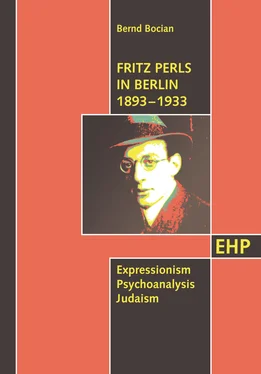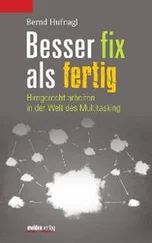Bernd Bocian - Fritz Perls in Berlin 1893 - 1933
Здесь есть возможность читать онлайн «Bernd Bocian - Fritz Perls in Berlin 1893 - 1933» — ознакомительный отрывок электронной книги совершенно бесплатно, а после прочтения отрывка купить полную версию. В некоторых случаях можно слушать аудио, скачать через торрент в формате fb2 и присутствует краткое содержание. Жанр: unrecognised, на английском языке. Описание произведения, (предисловие) а так же отзывы посетителей доступны на портале библиотеки ЛибКат.
- Название:Fritz Perls in Berlin 1893 - 1933
- Автор:
- Жанр:
- Год:неизвестен
- ISBN:нет данных
- Рейтинг книги:3 / 5. Голосов: 1
-
Избранное:Добавить в избранное
- Отзывы:
-
Ваша оценка:
- 60
- 1
- 2
- 3
- 4
- 5
Fritz Perls in Berlin 1893 - 1933: краткое содержание, описание и аннотация
Предлагаем к чтению аннотацию, описание, краткое содержание или предисловие (зависит от того, что написал сам автор книги «Fritz Perls in Berlin 1893 - 1933»). Если вы не нашли необходимую информацию о книге — напишите в комментариях, мы постараемся отыскать её.
Fritz Perls in Berlin 1893 - 1933 — читать онлайн ознакомительный отрывок
Ниже представлен текст книги, разбитый по страницам. Система сохранения места последней прочитанной страницы, позволяет с удобством читать онлайн бесплатно книгу «Fritz Perls in Berlin 1893 - 1933», без необходимости каждый раз заново искать на чём Вы остановились. Поставьте закладку, и сможете в любой момент перейти на страницу, на которой закончили чтение.
Интервал:
Закладка:
Based on Perls’s own recollections, during his secondary-school years he participated in »Oedipus the King« (Hugo von Hofmannsthal, following Sophocles) and Hofmannsthal’s »Everyman. The Play of the Rich Man’s Death.« The plays premiered in the 1910 and 1911 respectively and were produced in Berlin’s Zirkus Schumann which Reinhardt had rebuilt for the purpose: it seated an audience of 5,125. Theatrical productions in a circus were a revolution for conventional theater and were part of Reinhardt’s idea of restoring the vitality of theater. Reinhardt viewed theater as a total work of art. He collaborated with dramatists and composers, introduced three-dimensional sets and revolving stages, and experimented with light, music, mass scenes, and inclusion of the audience. In short, he laid the foundation for modern director’s theater. But Reinhardt’s central focus always lay on the creative personality of the actor and on bringing the classics up to date. He put modern people on the stage, and the audience could relate to their conflicts. The version of the ancient Oedipus story that he developed together with Hugo von Hofmannsthal impressed and may also have influenced his contemporary, Sigmund Freud (see Lorenz 2000).
In addition, Perls mentioned his participation in Goethe’s »Faust,« Part 2, which debuted on March 15, 1911, at the Deutsches Theater, and in »A Midsummer Night’s Dream,« which opened Reinhardt’s famous Shakespeare cycle on November 14, 1913.
Perls’s love of the theater was so strong that he seriously considered becoming an actor. He acted under contract at an open-air theater, which in turn provided enough money to finance his acting classes and also buy a motorcycle. Up until then, he had obtained his money through private tutoring and, since he received no allowance, by stealing from his mother’s purse. In the summertime, when the open-air theater was in operation, his daily routine ran like this: in the morning he did his homework in the streetcar on the way to school; after school he took a streetcar home again for lunch and then rode his bicycle to performances at the open-air theater. Following that, it was either back home again for a quick meal, or he headed directly to a performance at Deutsches Theater, which generally lasted into the night (see Perls 1977, 282). His sister Grete recalled that his coming home late often led to conflict with his father who sometimes simply locked him out; he would have had to spend the night outside if his mother hadn’t secretly let him in (see Gaines 1979, 3).
Together with Theo Freiberger, a neighboring boy who in the meantime apparently had a theater group of his own, of which Perls was also a member, he would travel to the small towns where the group performed (see Perls 1977, 281). Looking back, he did not describe himself as a good actor, although he was very adept at imitating the voices of many famous stage personalities.
Max Reinhardt had a profound influence on Perls. »Characters out of touch with their co-players had to go. Nothing was left untouched, until a play transcended into a world of reality, yet left enough room for the audience’s fantasy« (ibid., 282). The memories 35of these stage productions which he committed to writing late in life still testify to his unwaning appreciation and continuing enthusiasm for what he experienced (ibid., 282).
3.6.3 Perls the Actor. Revealing False Poses
Max Reinhardt’s views on acting and the theater awakened something in Perls that remained a vital part of him to the end of his life. In Reinhardt’s sense of the word, Perls was – and also wanted to be – an actor and comedian.
Nowhere do human beings reveal themselves more authentically, in purer, more childlike form than in acting. Bourgeois life is full of conventional lies. The actor’s goal is the ultimate innermost truth, because his profession is not to mask but to unmask, to reveal in all his transformations his innate personality. (Reinhardt 1993, 82)
Time and again, Reinhardt expressed outrage that bourgeois conventions blocked and flattened emotional life. It was important to him that the »emotional organs« were also working: »We unmistakably feel the way heartfelt laughter can liberate us, a deep sob relieve us, and an outburst of anger release us. Indeed, we often seek such outbursts with unconscious hunger« (ibid., 52).
The emotionally liberating element, 36the cathartic therapy of Breuer and Freud that stood at the beginning within the psychoanalytical context, was revisited in Ferenczi’s neo-catharsis. Wilhelm Reich, in particular, assigned this element a permanent place within his character analysis and was split off from orthodox psychoanalysis along with it, whereas Gestalt therapy, which assumed the legacy of Reich’s character analysis (see Bock 2000), always retained it as an important component.
In the early 1930s, Perls was impressed by the »acting« ability of his psychoanalytic teacher, Reich, who imitated his patients (see Ottersbach ibid., 6). And Perls repeatedly established contact with the world of the theater. For example, when he was in exile in South Africa he directed a theater circle, and during his period of collaboration with Paul Goodman in New York, his further contacts included Julian Beck and his wife Judith, founders of the experimental Living Theatre. Both of them were also of Jewish origin. Born in 1926 in Kiel as the daughter of a rabbi, Judith Malina studied together with Julian Beck at the New York Dramatic Workshop which was headed by Erwin Piscator, an émigré from Berlin (see Bundeszentrale 1991, 125).
Perls’s early theater experiences under Max Reinhardt, the techniques he drew from Moreno’s psychodrama and applied in modified form particularly during his last years, and impulses from collaborations with the Living Theatre, continued to live on in his famous/infamous demonstration sessions at Esalen Institute in California, which he himself referred to as his »circus.« Here, he could be confrontational or communicate gently. He often behaved like a stage director, guiding a person who had been seated on a chair in the middle of the group and making the individual act out and experience the polarities of his personality or dreams. During this period, Perls considered himself a »good actor and performer, easily achieving a chameleon-like transformation« (Perls 1977, 284).
In terms of Reinhardt’s thinking, Perls differentiated between avocation 37[sic] and pretending. In a[e]vocation, he wrote, »you use the role as a vehicle to bring your essence across. You are supported by your skill, genuine feelings, and sensitivity. (…) In pretending, you lack this self-involvement. You fake an emotion that is not there, you lack the confidence in your ability. In short, you are a phony« (ibid., 138).
During the popularity of his later years, Perls was certainly a person who presented himself in the sense of »a[e]vocation.« The critics who see him more as a theater director than as a Gestalt therapist in this process, appear to remain on the surface in my opinion. For one thing, Perls was an experienced psychiatric and psychoanalytic clinician and clearly recognized the difference between a therapy session with a client as opposed to a demonstration session surrounded by an audience consisting predominantly of professionals (see Perls ibid., 215, 229, 262), a point which was also confirmed by his extremely critical wife (see L. Perls 2001, 29). For another, this was a question of his style of Gestalt therapy, which he only demonstrated effectively to an audience during the last years of his life. It was a »synthesis of drama and therapy« (Clarkson et al. 1995, 36) that was very much a part of the cathartic-psychoanalytic tradition. Breuer and Freud (1991) dramatized remembered scenes and inner conflict externally and, in the case of »Anna O.,« for example, reenacted them quite concretely in the therapy room. In this respect, Perls’s dramatization of fantasies, dreams, and inner conflicts as part of his work with the two chairs can definitely be viewed as both a resumption and a further development of Ferenczi’s experiments with »forced fantasies« (see Bocian 2009).
Читать дальшеИнтервал:
Закладка:
Похожие книги на «Fritz Perls in Berlin 1893 - 1933»
Представляем Вашему вниманию похожие книги на «Fritz Perls in Berlin 1893 - 1933» списком для выбора. Мы отобрали схожую по названию и смыслу литературу в надежде предоставить читателям больше вариантов отыскать новые, интересные, ещё непрочитанные произведения.
Обсуждение, отзывы о книге «Fritz Perls in Berlin 1893 - 1933» и просто собственные мнения читателей. Оставьте ваши комментарии, напишите, что Вы думаете о произведении, его смысле или главных героях. Укажите что конкретно понравилось, а что нет, и почему Вы так считаете.











